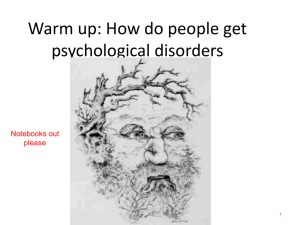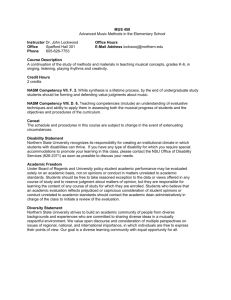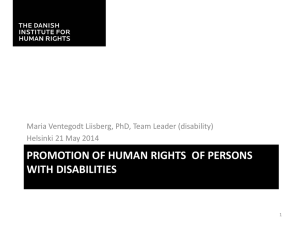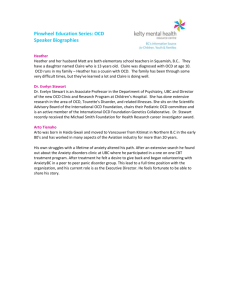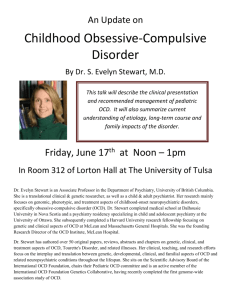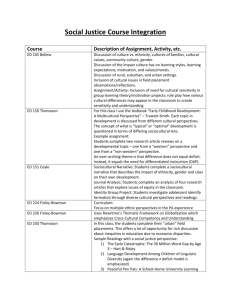Paper
advertisement
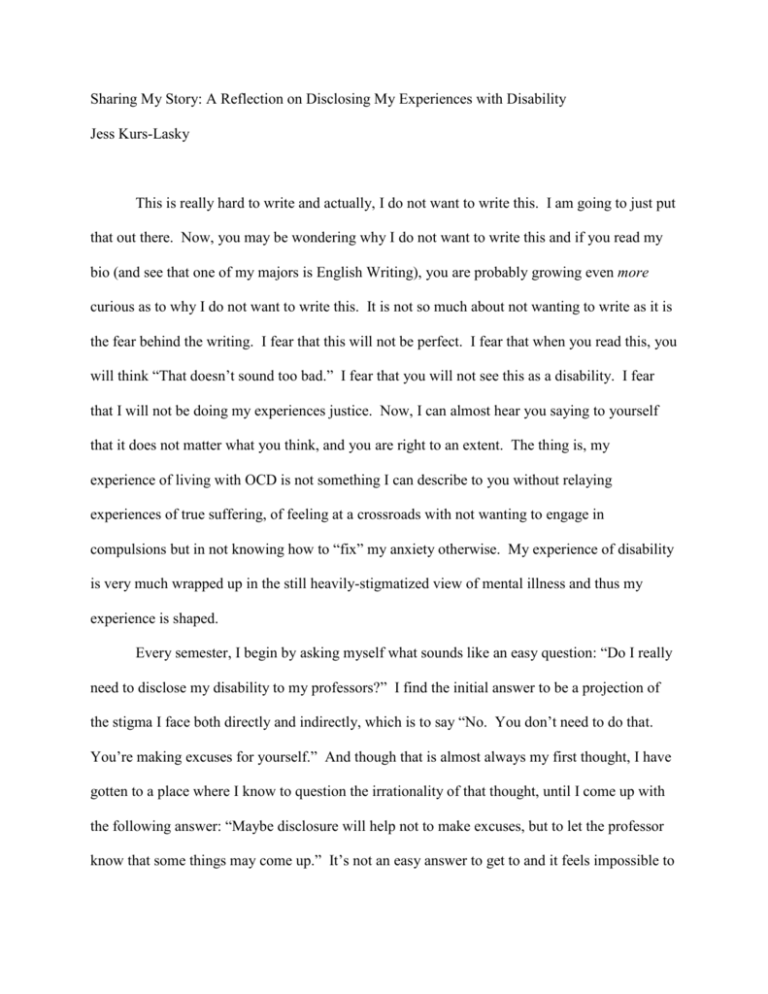
Sharing My Story: A Reflection on Disclosing My Experiences with Disability Jess Kurs-Lasky This is really hard to write and actually, I do not want to write this. I am going to just put that out there. Now, you may be wondering why I do not want to write this and if you read my bio (and see that one of my majors is English Writing), you are probably growing even more curious as to why I do not want to write this. It is not so much about not wanting to write as it is the fear behind the writing. I fear that this will not be perfect. I fear that when you read this, you will think “That doesn’t sound too bad.” I fear that you will not see this as a disability. I fear that I will not be doing my experiences justice. Now, I can almost hear you saying to yourself that it does not matter what you think, and you are right to an extent. The thing is, my experience of living with OCD is not something I can describe to you without relaying experiences of true suffering, of feeling at a crossroads with not wanting to engage in compulsions but in not knowing how to “fix” my anxiety otherwise. My experience of disability is very much wrapped up in the still heavily-stigmatized view of mental illness and thus my experience is shaped. Every semester, I begin by asking myself what sounds like an easy question: “Do I really need to disclose my disability to my professors?” I find the initial answer to be a projection of the stigma I face both directly and indirectly, which is to say “No. You don’t need to do that. You’re making excuses for yourself.” And though that is almost always my first thought, I have gotten to a place where I know to question the irrationality of that thought, until I come up with the following answer: “Maybe disclosure will help not to make excuses, but to let the professor know that some things may come up.” It’s not an easy answer to get to and it feels impossible to sit with that, but a big part of learning to live while still suffering from OCD is learning to live with the discomfort and uncertainty. As someone once pointed out to me, good things can happen but you have to be willing to leave your comfort zone first. My experience with OCD is a learning process, one that has no finite endpoint, and one that continues to work its magic yet still sometimes beats me to the chase. My hopes in sharing my story are not to say that I have “overcome” my OCD, but to show that there is a spectrum of disability and a spectrum of experiences that are not always conducive to the black-and-white thinking of “Is this person abled or disabled?” While it is not easy to uncover all the things that get to me, I know it is an important part to my process toward coping, and I hope it will begin the conversation for others, as well. As I previously explained, this task is daunting, and I want to avoid it at all costs because, as my OCD is telling me This won’t be perfect. Don’t do it. And while that may sound like it is not “so bad” in small doses, my brain finds haven in the “all-or-nothing thinking” that is often associated with perfectionism. This perfectionism gets in the way of nearly every single homework assignment I have to do, no matter how “easy” or “quick” the task may be for someone not living with a disability. My experience with disability is that there is no task that is really ever “easy” or “quick” because that is where my obsessions and compulsions find refuge and bask in what would be an otherwise easy thing to accomplish. Take, for example, an assignment I had in one class (I will call the class and professor by anonymous pseudonyms for protection of their identity). In Class 101, an introductory-level course, Professor A assigned weekly one-page reflections. In these reflections, we were assigned to simply sit down and write down our thoughts regarding the reading. Now, this seems like an “easy” task, especially for someone such as myself (an English Writing major), but instead, I found myself very literally paralyzed by the fear that What if this is wrong? I knew, on the one hand, that this was ridiculous because reflections cannot really be “right” or “wrong” since they are purely opinion-based, but still, I was paralyzed. I could not do the reflections. I sat in front of the computer for literally hours on end trying to get words on paper. I knew what I wanted to say but was caught up in the realization that no matter what I did, the work I turned in had no chance of being perfect. And that terrified me. And so, I decided, I would not turn in that assignment, because obviously that is the “cure” for wanting to perfect something, I would do the exact opposite and do nothing at all. This did not work either and was frustrating when Professor A asked me why I had outstanding work and I was forced to try to explain the hard time I was having with the work. One last example is with reading. Reading is a blessing and a curse. On the one hand, I am an English Writing major, so I live to write (and therefore read, as well), but on the other hand, reading is my worst nightmare. Sometimes, reading is relatively painless for me. Other times, I am not so lucky. I will sit with the reading material in front of me reading the sentences over and over again until I can say them correctly in my head, until it feels “just right,” and I can assure myself that I am most definitely putting emphasis on the correct words. If it does not feel right or if I cannot picture what I am reading, I get stuck. Sometimes, even looking at a column of text, depending on the format, can trigger my compulsions and I cannot read the page. And once again, I am faced with the big question of: “Do I disclose my disability? If so, when?”



